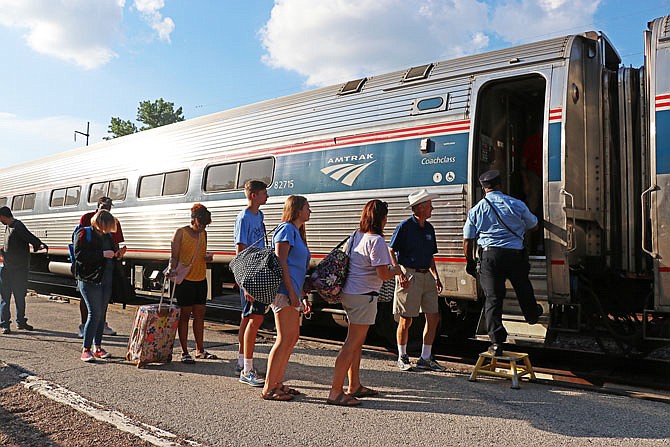A budget plan advanced by a House committee would keep Amtrak's Missouri River Runner service running two round trips between St. Louis and Kansas City every day, but lawmakers still need a way to pay for it.
Amtrak trains on the Missouri River Runner line make two daily round trips between St. Louis and Kansas City, with eight stops in between. The state has built up a $12 million debt to Amtrak over the past decade, and lawmakers are debating whether to cut service or set aside more money for it.
House Budget Chair Cody Smith, R-Carthage, moved last week to stop the state from subsidizing more than one round trip a day. The committee voted 19-16 on Sunday to undo his amendment, but Smith warned they can't keep underfunding the service and that lawmakers would need to find a way to pay the full Amtrak bill.
Under Smith's amendment, the River Runner could still run twice a day, he said. The state would just pay to subsidize one trip, so Amtrak would have to look at raising fares to make up the difference, he said.
The Legislature has appropriated $9.1 million to pay the contract each year since 2017, and it asked for the same core funding this year.
That's never been enough to cover the contract, which operating costs and inflation have pushed from $10.6 million in 2017 to $12 million next year - meaning the state will owe $2.9 million more than the core appropriation for River Runner service for next year alone. To pay the debt and the shortage for this year and next, the Missouri Department of Transportation would need another $12.2 million from the Legislature, which the current plan includes.
Smith said his plan was to pay what the state owes, then limit the service to what the Legislature was willing to pay for so it didn't end up owing money again. If the state doesn't pay its bill right away, it's going to start growing even faster.
With directions from Congress to try to break even or turn a profit, Amtrak started charging 12 percent interest on the state's arrears last year. So far, Amtrak hasn't threatened to stop service over the late bill, but MoDOT Director Patrick McKenna previously told the News Tribune he believes they would at some point. That would trigger another bill for the state.
The Legislature agreed in 2014 to keep the train running in exchange for $50 million from the federal government to improve stations along the line. If Amtrak shut down service, the state would have to pay back about $36 million of that.
State Rep. Aaron Griesheimer, R-Washington, pushed to undo Smith's amendment and keep funding two trips a day. He represents Hermann and Washington, both stops on the River Runner.
Story continues below related article.
Griesheimer and representatives from St. Louis and Kansas City argued it was good for commuters and tourism, keeping traffic off the highway and bringing visitors to spend money. It also has value in connecting the two largest cities in Missouri at a subsidized cost, they said.
Cutting service to once a day would also make it impossible for commuters to use it since they would need to find another one-way form of transportation for the other leg of their trip, Griesheimer said. That would be another blow to ridership, and McKenna said Amtrak could pull the service entirely if it wasn't viable, triggering the $36 million bill to the federal government.
State Rep. Deb Lavender, D-Kirkwood, said people in her district frequently ride the train from Kirksville to Hermann or Washington and back for a day trip, spending money in those towns, which rely on tourists. Every dollar the state spends on tourism results in tourists spending more money within the state, she said.
Lavender proposed using tourism funds to cover the remaining balance, but she withdrew her amendment after Lynn Struemph, director of finance for the Division of Tourism, testified that they would have to cut advertising and promotions if the money was taken from that fund.
"Tax dollars benefit the entire state," Lavender said. "Whether people are traveling from my district or Rep. Griesheimer's district, they are spending money."
The Amtrak funding is a relatively small portion of MoDOT's $3.66 billion budget. But while the vast majority of MoDOT's functions are paid by dedicated user fees, fuel taxes and federal funds, Amtrak is funded by the state's general revenue.
State Rep. Dirk Deaton, R-Noel, said Sunday that the Legislature has to consider that it will have to appropriate more money each year to pay for the gap between the core appropriation and the rising contract if it decides to keep subsidizing two trips a day. That gap is $2.6 million this year and $2.9 million next year, and it will continue to rise as the cost of the contract increases.
When the issue came up in a January budget hearing, Deaton criticized how much the state was subsidizing the service. The state's per-rider contribution to the service has increased from $48 in 2014 to $53 this year. It would be $124 next year under MoDOTs plan to pay off all its arrears in one year, and $70 if the state paid its full contract. The state subsidy is more than some riders pay, with tickets from Kansas City to St. Louis running from $36-$87.

